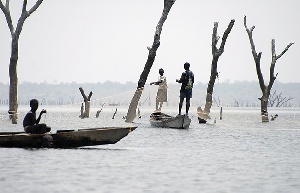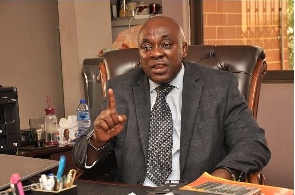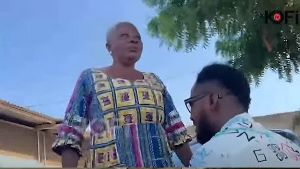 Children fishing on the Volta lake
Children fishing on the Volta lake
Children are said to be the future of the world but how realistic is this saying in the case of Ghana our beloved country? Does the youth of Ghana really have a future at all when their rights and privileges are being trampled upon each and every day? Ghana as the beacon of Africa has marked its 60 anniversary recently with pomp and pageantry to the admiration of the whole world, a milestone which was vividly celebrated across the length and breadth of the country owing to its importance and significance. It means Ghana as a country has come a long way having grown in size independently, democratically, politically and peacefully.
Sixty years of independence of any nation is no joke at all but the question is can its growth be measured in terms of age? Well I don’t think so. But come to think of it why are we still lagging behind as a nation in terms of development compared to other countries who gained independence not too long ago but did achieved a lot in terms of development in within a short term?. I believe something is wrong somewhere which needs to be fixed urgently before it gets out of hand.
Ghana as a country has almost 25 million populations with 40% population being children which is considered sometimes to be a country of great future leaders. Young people are a crucial segment of society; they are the basis for future development. It is said that not only the youth are leaders of tomorrow but the partners of today which means they have some responsibility towards their country. A child is a person below the age of 18, according to the children’s Act of 1998(Acts 560). The National Youth Policy also defines a youth as a person aged between 15 and 45. The children and the youth are therefore the most active and vibrant of the entire population of Ghana. By this definition, it is no doubt that huge number of youth in the Ghana has great potentials of creating sustainable development for the country, however it is the responsibility of government to create appropriate economic and educational environment for them to go to school and actively participate in national development.
Unfortunately that hasn’t been the case of Ghanaian youth today as many children are deprived of school and rather engage in hazardous child labour. Some are lured, others are forced and many others are compelled due to financial problems, family pressures among others.
It is very sad to note that majority of our children and youth in Ghana today are still living in worst forms of modern slavery today. A worrying situation which casts gloomy picture on the future of this nation as far as development is concerned. Children are always believed to be a gift from God and are supposed to be taken care of appropriately as they deserve to live a life of dignity no matter the situation but what we see in Ghana as far as the welfare of children and the youth are concerned is indeed the direct opposite. Education is the key in guaranteeing a better future for children and for that matter a way out of poverty. But for children within Ghana, a better future could be a mirage if care is not taken to combat modern slavery. The phenomenon of modern slavery in Ghana today is rampant gradually destroying the future of our youth and children at an alarming rate. Also known as human trafficking or trafficking in persons, modern slavery refers to the recruitment, transportation, harboring or transfer of a person from one place or the other against the real will of the victim for the purpose of forced labour, sexual exploitation or organ trade. Although both the children’s act, 1998(Acts 560) and human trafficking Act,2005(Act 694) condemns child labour and human trafficking making it illegal, yet child labour and modern slavery is still rife happening every day and everywhere in all the regions of the country.
Various forms of human trafficking in Ghana today include child trafficking in fishing, child labour in farming(cocoa), domestic servitude , sexual exploitation, sex tourism and prostitution, head porterage or (“Kayaye”), child trafficking in illegal mining(“Galamsey”) and Trokosi, forced marriage or child mutilation and child sacrifices among others.
According to Engage Now Africa (ENA), an international NGO which focuses on ending poverty in Africa, out of 2.4 million children in Ghana between the ages 5 – 17 today, 1.86 million of them are victims of child labour. In addition to 49,000 children working on Lake Volta of which 21,000 of them are already engaged in hazardous child labour.
Human trafficking is illegal in Ghana according to the human trafficking Acts 694 of 2005, using your child or another person’s child for child labour in its various forms is an offense which is punishable by law. The barbaric act in Ghana has become rampant growing at a fast alarming rate with over 190,000 people being victims of the barbaric act as we speak today like diving into a deepest depth of a river to remove a trapped net including other dangerous works that put lives of these children at risk.

Although this alarming development is of major concern to the citizenry including Non-Governmental Organizations (NGOs), Civil Society Organizations and other stakeholders in the country, sadly enough nothing concrete is being done on part of the law enforcement agencies to implement the law by getting perpetrators arrested, prosecuted and punished accordingly. That has indeed been the bane of Ghana over the years in its bid to eliminate the menace of modern slavery.
One would ask, as we celebrate the 60thIndependence Anniversary, “Is there any future for our children?” as thousands of them are trapped in all forms of child labour and modern slavery. I strongly believe it’s a kind of question that keeps ringing in the hearts of many Ghanaians today begging for an answer which we must all explore to the latter so as to find solutions to in order to end modern slavery in the country.
Director of End Modern Slavery for ENA, David Kofi Awusi believes there’s hope if everyone plays collective role in the fight against the canker.
He disclosed efforts of past and present governments to thwart the menace through enactment of laws, development of policies and plans have been phenomenal but failure on its part to implement those laws and policies has been the impediment to end modern slavery.
He therefore called on law enforcement agencies in the country to rigorously enforce the law without fear or favour to the latter to see to it that perpetrators are arrested, prosecuted and punished to serve as a deterrent to others. “Prosecution must work; the laws must be enforced to get people to avoid issues of trafficking because they know that if they do it they can be arrested so without an impunity control more and more people will be incentivized to do this work”.
Finally, David Awusi wants government to be sensitive to issues of modern slavery like illegal- mining popularly known as ‘galamsey’. His strong desire is to see all children in school instead of engaging in child labour which will only ruin their future.
Deputy Western Regional Minister, Gifty Eugenia Kusi addressing participants at the education and sensitization durbar for stakeholders and civil society organization on modern slavery held at the Teachers Hall on Thursday, May 18 2017, in the Takoradi metropolis of the Western Region shared similar view expressed by David Awusi that government needs to strongly back up in its efforts to put a stop to the practice of modern slavery at all cost.
She said: “Though past and present governments have put in programs and strategies to achieve this, I think that there’s more left to be done. This is because out of the 24 million population, 2.4 million children population age between 5 -7, 1.86 million of them are victims of child labour.”
Mrs. Gifty Eugenia Kusi bemoaned the rate at which the future of Ghanaian children for that matter the youth are gradually being destroyed as a result so-called human traffickers.
But there is hope said the Minister, "because as a government of the New Patriotic Party(NPP), we are going to work together with all stakeholders and Civil Society Organizations to create the enabling environment that can nurture our children and youths for a better tomorrow through policies that we already have” But we need to put in more free SHS to work, school fees in MASLOC, youth employment programs, National Health Insurance, the LEAP and more recently planting for food and jobs where subsidized seeds and fertilizers are distributed to our farmers”.
The durbar, an initiative of End of Slavery Department of Engage Now Africa was on the theme “Ghana @ 60: Is there any future for our children and youth. It brought together over 250 participants made up of stakeholders, civil societies and students across 8 districts within the southern belt of Western Region to dialogue in order to find ways of combating the menace of modern slavery in the country. The eight selected districts were Wassa East District Assembly, Shama District Assembly, Sekondi-Takoradi Metropolitan Assembly, Mpohor District Assembly, Ahanta West District Assembly, Nzema East District Assembly, Elemmbelle District Assembly and Jomoro District Assembly.

At the forum, numerous concerns were raised on why people are being trafficked out of Ghana on daily basis to other countries like US, Kuwait, Saudi Arabia, Indonesia, Qatar, Ivory Coast, Gabon, Libya and others and what must be done to halt the practice which Western Region is equally a major hit in Ghana. According to the Ghana living standards survey 6 of 2013, Western Region is no way exempted from the canker of child labour.
As child labour in fishing, farming, illegal mining called “galamsey”, child prostitution, domestic servitude and others are rampant in the Region.
Various factors raised by the participants pointed out to poverty, ignorance, large family size, high profitability (greed), low risk of arrest and weak political will on part of government to stop the act as the causes of the everyday modern slavery. For over hundred thousand people trapped in modern slavery or human trafficking in Ghana today, according to the global survey of 2016, majority of these people are indeed children.
According to David Kofi Awusi, Director for End of Modern Slavery, Engage Now Africa, the rationale behind organizing the durbar forms part of efforts to secure a better future for our youth and children. “If every child is given proper education, they can become whatever they’ve envisaged to become in the future”. He said his outfit is passionate about children’s welfare hence the introduction of its five “PEERD Model” (Participate, Educate, Engage Restore and Deter) which is geared towards combating modern slavery at all cost.
For him, eradicating modern slavery is not an easy task which requires the support of everyone including a combination of effective intervention techniques like education, awareness creation, engaging people rescuing among others which is high on his outfit’s agenda encapsulated in its anti-slavery model called the “PEERD Model”.
Engage Now Africa (ENA) is poised in the fight against modern slavery with the focus of ending poverty in Africa. It is currently operational in 5 African countries namely Ghana, Namibia Sierra Leone, Uganda and Ethiopia. Currently in Ghana, ENA is operating in all the 10 administrative region strengthening individuals, families and communities to end poverty by instilling hope and teaching principles of sustainability in education, self – support assistance, clean water, medical services, and orphan support and above all the eradication of modern slavery.
Engage Now Africa (ENA) has received overwhelming commendation and endorsement from the Deputy Western Regional Minister, Gifty Eugenia Kusi for their unwavering support in the fight against modern slavery in the country especially for the move in choosing Western Region as an area to partner stakeholders to support development. Gifty Eugenia Kusi pledging her support for the NGO said: “We in the Regional capital welcomes you and sincerely pledge our support in whatever form possible that we can help you”.

Joseph Kobla Wemakor












